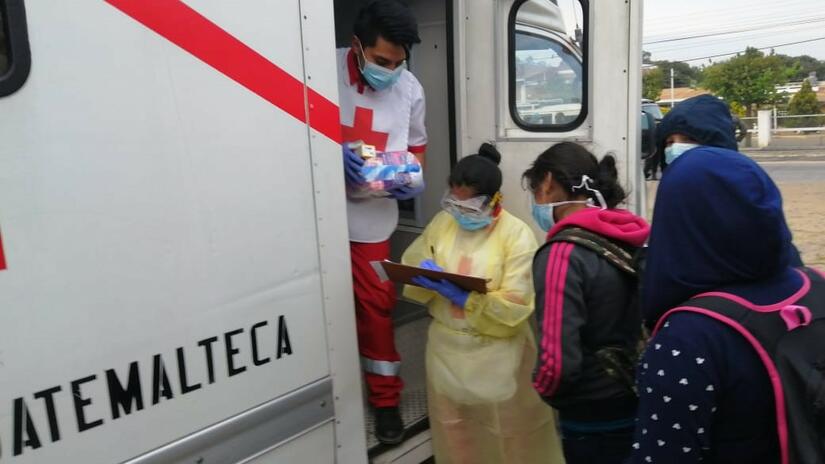by Olivia Acosta
It has been more than five months since the borders were closed in Guatemala and a considerable number of people in transit have been blocked inside the country. The situation is a challenge for Guatemala since many of the migrants must resort to finding jobs or generating economic activities in the country, in order to survive. In most cases, migrants are forced to live in local villages near border points, which is also a challenge in terms of harmonious coexistence between local people and migrants.
Most of them have economic difficulties and they take risk by leaving their countries looking for a better life. Their transit through Central America is always very complex, but now with the situation created by the COVID-19 pandemic, everything has become even more difficult and they rely on the support from organizations such as the Red Cross to solve some of their needs. This is the case of Hosni Contreras, a Nicaraguan who was trapped in Petén, Guatemala, after the borders were closed, and two months ago was hit by a vehicle. "The Guatemalan Red Cross helped me in my recovery process. Now I feel much better, I can walk without crutches," says Hosni.
As part of the response to support people like Hosni, one of the main projects implemented by the Guatemalan Red Cross since 2014 takes place at the departments of Petén, Chiquimula and San Marcos. The project is carried out in coordination with UNHCR and seeks to generate actions to strengthen capacities at institutional level related to assistance and protection for migrants; referral actions to relevant institutions for protection cases; development of communications (Restoration of Family Links, RFL); and activation of awareness and protection processes in transit communities. So far, more than 47,000 people have been assisted.
Thirty volunteers work on the project. The Guatemalan Red Cross has been carrying out permanent training activities for volunteers to respond in the context of COVID-19. “We want our volunteers to be safe, without the risk of getting infected, and to know how to work better to support migrants," says Hector.
The Guatemalan Red Cross is doing an important work to inform this population about the virus and to promote prevention measures. "We do this work in the communities, and produce didactic material to share something attractive for them to become familiar with the messages. Also, we have done an important work from communication with social networks and other channels to reach them with messages in an efficient way," says Hector.
The work that the National Society has been undertaking has focused primarily on generating sustainable processes, which has involved the active participation of communities. "It is a very intense work that we have been developing over the years. We have generated mechanisms that have changed behaviors. We have seen that the perception of the local people has been transformed, and they are even helping migrants on their own".
In this sense, the Guatemalan Red Cross works to develop sustained processes to identify the needs of migrants. "We do this in three ways: one is through direct assistance: since migrants enter Guatemala we establish communication with them. The second one is through dialogue with key actors in the communities. By spending more time in the communities, we have more time to talk with them, to generate trust, and people tell us about their concerns. And also, we are working with the government to generate a systematic record from the feedback we get from them.”
With the arrival of the pandemic, the Guatemalan Red Cross has been adapting its processes according to the evolution of different scenarios. The project has been developed during three years and will continue to be executed towards 2021. "We don't really know exactly how we will be working in two months since the situation is constantly changing, but we will continue with all our efforts to support the migrants," says Hector.
Article
Sudan: 'the most difficult year' after outbreak of conflict
Sudan: 'the most difficult year' after outbreak of conflict
| Article

